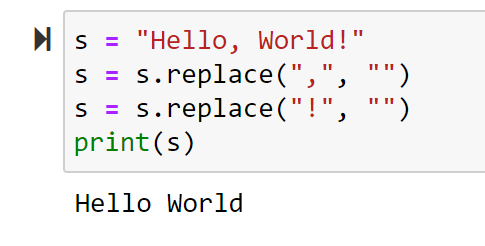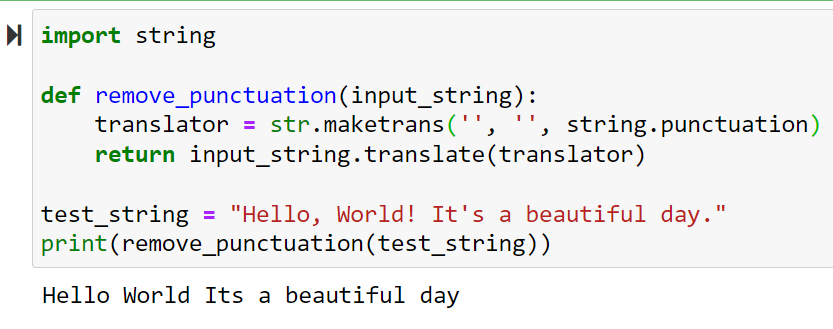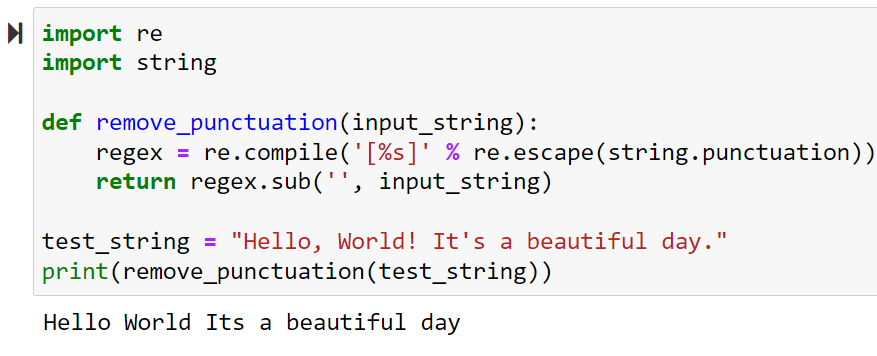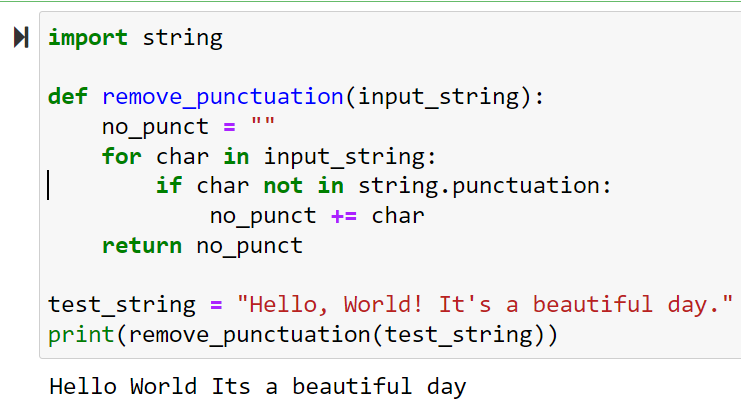One common task when working with text data in Python is removing punctuation marks from strings. Punctuation marks can be a nuisance when performing text analysis or natural language processing tasks, and removing them lets you clean up your data and focus on more important aspects, such as word frequency and sentiment analysis.
To remove punctuation from a string in Python, you can use the str.translate() method with the .maketrans() method. You can also use a “for” loop to construct a new string excluding punctuation marks.

In this guide, we’ll explore different methods and techniques to remove punctuation marks from strings in Python. This will help you choose the most suitable method for your project.
Let’s get into it!
Basics of Removing Punctuation from a Python String
Before we start writing the code for removing punctuation characters from a string, let’s quickly review some of the basic concepts of removing punctuation from a string in Python.

What Are Python Strings?
In Python, strings are sequences of characters enclosed in either single or double quotes. These characters can include letters, digits, special characters, or special symbols, such as punctuation marks.
You can use built-in functions and methods specifically designed for Python string manipulation to manipulate strings and perform substitutions to remove that random errant question mark.
What Are Punctuation Marks?
Punctuation marks are symbols used in written language to clarify sentence structure. These marks include commas, periods, exclamation marks, question marks, colons, semicolons, and more.
You may want to eliminate punctuation marks from a string for processing purposes, such as text analysis or natural language processing.
The following code is an example of removing punctuation from a string:
import string
def remove_punctuation(input_string):
# Make a translation table that maps all punctuation characters to None
translator = str.maketrans("", "", string.punctuation)
# Apply the translation table to the input string
result = input_string.translate(translator)
return result
# Sample string with punctuation marks and spaces
text = "Hello, world! This is a sample string with punctuation. And spaces!"
# Remove punctuation from the string
output = remove_punctuation(text)
# Print the original and modified strings
print("Original string:", text)
print("String without punctuation:", output)
In the example above, the remove_punctuation() function takes an input string and creates a translation table using str.maketrans() that maps every punctuation character to None.
Then it applies the translation table to the input string using the translate() method. The result is a new string without any punctuation marks.
This method also preserves spaces between words, making it suitable for processing text data in various applications.
The output of the above code is:
Original string: Hello, world! This is a sample string with punctuation. And spaces!
String without punctuation: Hello world This is a sample string with punctuation And spacesWhat Are the Methods of Removing Punctuation in Python?
We’ll now discuss different ways to remove punctuation from a string in Python.

Specifically, we’ll cover the following methods:
- Using replace() method
- Using translate() method
- Using regular expressions
- Using “for” loop
1. How to Use Replace() Method to Remove Punctuation
You can use the replace() method in Python to remove punctuation marks from a string. This method takes an initial pattern and a final pattern as parameters.
It returns a resultant string where characters of the initial pattern are replaced by characters in the final pattern.
By replacing each punctuation string with an empty string, we can effectively remove them from original string.
This example demonstrates using replace() method to remove punctuation from string:
s = "Hello, World!"
s = s.replace(",", "")
s = s.replace("!", "")
print(s)When you run this code, it’ll output:
Hello WorldIn this example, replace() removes the comma and the exclamation mark from the original string “Hello, World!”.

2. How to Use Translate() Method to Delete Punctuation
You can also use the translate() method to remove unwanted characters from a string in Python.
This method requires a translation table, which you can create using the maketrans() method. With the translation table set to strip punctuation marks, you can then use the translate() method to get the desired output.
This example shows you how to use the translate() method:
import string
def remove_punctuation(input_string):
# Make a translator object to replace punctuation with none
translator = str.maketrans('', '', string.punctuation)
# Use the translator
return input_string.translate(translator)
test_string = "Hello, World! It's a beautiful day."
print(remove_punctuation(test_string))In this script, we are using the str.maketrans() function to create a translation table, which maps each punctuation character into None. Then we use str.translate() function to apply this table to our string.
When you run this code, it’ll print:
Hello World Its a beautiful day
3. How to Use Regular Expressions to Delete Punctuation
A regular expression pattern can be a powerful tool for text processing.
You can use the Python re module to create empty strings with a pattern that matches all punctuation marks. You can then use the sub() method to replace them with an empty string.
The following example demonstrates this method:
import re
import string
def remove_punctuation(input_string):
# Make a regular expression that matches all punctuation
regex = re.compile('[%s]' % re.escape(string.punctuation))
# Use the regex
return regex.sub('', input_string)
test_string = "Hello, World! It's a beautiful day."
print(remove_punctuation(test_string))In this script, we’re compiling a regular expression that matches all punctuation. The re.escape(string.punctuation) part is needed because some punctuation string marks have special meaning in regular expression.
The sub() function then replaces any matched pattern string (in this case, any punctuation) with an empty string.
This will output:
Hello World Its a beautiful day
4. How to Use “for” Loop to Remove Punctuation
You can use a simple for loop to remove punctuation marks from a string. By iterating through each character in the input string and checking if it is a punctuation, you can build a new string that excludes all the punctuation marks.
The following example shows you how to use for loop to remove punctuation:
import string
def remove_punctuation(input_string):
# Make an empty string to hold the new string without punctuation
no_punct = ""
for char in input_string:
# If the character is not punctuation, add it to the new string
if char not in string.punctuation:
no_punct += char
return no_punct
test_string = "Hello, World! It's a beautiful day."
print(remove_punctuation(test_string))In this script, we’re creating a new string no_punct and filling it with each character from the original string that’s not a punctuation mark.
When you run this code, it’ll output:
Hello World Its a beautiful daySo, all punctuation in the test_string has been removed.

To learn more about string manipulation in Python, check the following video:
Final Thoughts
Understanding how to manipulate and clean text data, such as removing punctuation from a string, is an essential skill when programming in Python. This is because text data is everywhere, in web pages, files, databases, and more. Therefore, knowing how to process and transform this data is invaluable.
Consider tasks like data analysis, machine learning, or even web development. Often, you’ll find yourself working with text. Punctuation can cause issues in these scenarios. It might skew your analysis or confuse your machine learning algorithm.
By learning how to remove unnecessary symbols, you’re equipping yourself with a powerful tool to prepare your data better. You make your text data cleaner, more uniform, and ready for further processing!
Frequently Asked Questions
In this section, you’ll find some frequently asked questions you might have when removing punctuation from a string.
What is the best method to remove punctuation from a Python string?
The “best” method depends on your specific situation and needs.
For simple, one-off replacements, str.replace() could be sufficient.
If you need to remove all punctuation, using str.translate() with str.maketrans(), or re.sub() with a regular expression, are more efficient.
A for loop can also be used for more control over the process.
Are there situations where I wouldn’t want to remove punctuation from text data?
Yes, context is key. In some natural language processing tasks, punctuation can provide valuable information about sentence structure or sentiment (like the difference between a statement and a question).
Can I replace punctuation with something other than an empty string?
Yes, you can replace punctuation with any string you want, such as a space, using the techniques discussed in this article.
Does the re module work with languages other than English?
Yes, the re module works with any Unicode characters, so it can be used with text in any language.
However, the string.punctuation constant only includes punctuation commonly used in the English language.
What if I only want to remove specific punctuation marks and not all?
You can customize all the methods mentioned to only remove specific punctuation marks.
For example, with str.replace(), you can specify the exact punctuation you want to replace. In the case of str.translate(), re.sub(), and the for loop method, you would adjust the punctuation list to include only the marks you want to remove.








